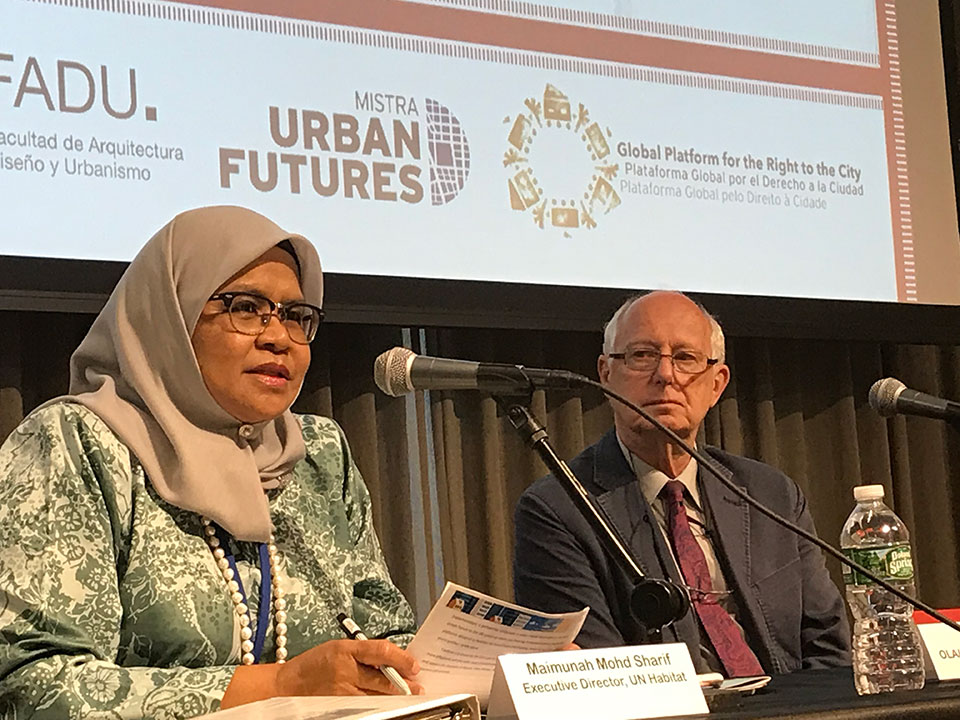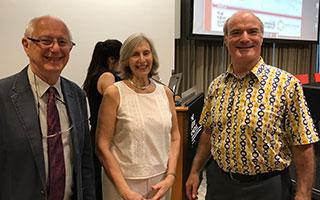
To get from 'the what to the how' - towards resilient cities
We have the knowledge. Or even the ‘knowledges’, as Mistra Urban Futures Director David Simon put it, acknowledging the knowledge of stakeholders and other actors in society. Now is the time to actually do it, use the data and knowledge we have to rethink and transform our cities towards sustainability in all its dimensions.
Now is the time to actually use the data and knowledge we have to rethink and transform our cities towards sustainability in all its dimensions - the take-away message from the side-event organised in New York with The New School.
Safe and affordable housing, including upgrading of slums, is one of the targets of the Sustainable Development Goal 11, the ‘Urban’ goal. The objective is expressed as reducing the proportion of people living in slums, and this has so far been the case. However, as the urban populations grow, the number of people living under such conditions is actually increasing; on a global scale it is almost 900 million.
From project to process and progress
In Buenos Aires, one of Mistra Urban Futures’ partner cities, several initiatives have been taken to transform ‘Villas’ to ‘Barrios’, from slums to neighbourhoods. To some extent, this is – of course – about improving access to water, electricity, sanitation and other infrastructure such as schools and relevant public transport. But it is also about working with the people in the villas to frame the social dimensions in a way that promotes interaction, economic activities and participation.
‘This is a process, not a project’, said Martin Motta, City of Buenos Aires, thus emphasising that urban transformation is a long-term ongoing concern. It is something else than the many ‘projects’ that may be separate and most valuable parts of the process – such as the many individual projects all over the world; the exchange of ideas and experience between cities is also something to work on, not least through the networks of Mayors and cities.
One such network is the 100 Resilient Cities, which – funded by the Rockefeller Foundation – has contributed to the employment of resilience managers in member cities. Shared knowledge about resilience strategies is crucial, to minimise loss of human lives, injuries and damage from floods, extreme weather and other effects of climate change.
Boxes and silos
‘Rethinking’ is a keyword for the transformation of cities, as expressed by several of the panellists in the event.
The Executive Director of UN-Habitat, Maimunah Mohd Sharif, even suggested that it is no more ‘thinking outside the box’ – it is about thinking without the box. Ms Mohd Sharif opened the event with an encouraging and, as usual, highly personal talk about the opportunities and calls for action that are embedded in the New Urban Agenda – leaving no one behind.

The now infamous ‘silos’ in which many people work were a recurring topic among all speakers, and the absolute need to leave that kind of organisation and thinking, in favour of collaboration and co-production of knowledge is crucial. Such co-produced and transdisciplinary knowledge is generally more action-oriented, empowering those who are involved. And that is exactly what is needed:
‘We need to get from the what to the how’ was the final conclusion of Michael Cohen, Professor at The New School and with Professor Margarita Gutman, host of the day.
Photos: top Executive Director of UN-Habitat, Maimunah Mohd Sharif, with Prof Michael Cohen, The New School. In text: Professors Michael Cohen, Margarita Gutman and David Simon, hosts of the side-event.
Written by Jan Riise
Reflection notes from the conference are available at the event page, under 'Files.